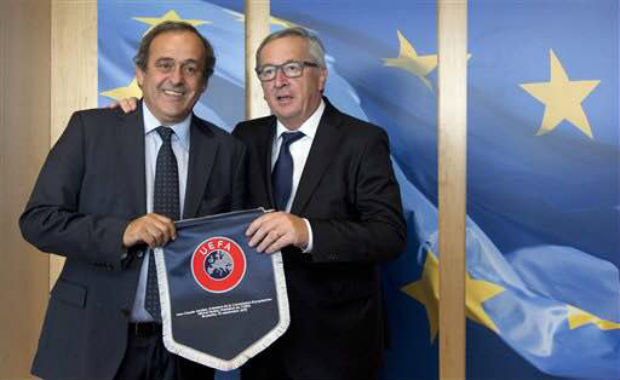UEFA explores creating third European club competition

European Commission President Jean-Claude Juncker, right, holds a banner as he greets UEFA President Michel Platini prior to a meeting at EU headquarters in Brussels on Thursday, Sept. 10, 2015. AP
JULIAN’S, Malta — European football leaders have discussed the possibility of creating a third club competition.
At a meeting of the 54 UEFA members on Wednesday, they explored the merits of a new competition for teams that fail to advance from the qualifying rounds for the Champions League or second-tier Europa League.
They also considered whether the competition could be reserved for teams from smaller countries who never participate in the group stages of the existing cups.
The discussions are at an early phase, and any changes to the club competition structure in Europe would not be introduced until at least 2018, when the current round of TV rights deals expire.
Scottish Football Association chief executive Stewart Regan told The Associated Press that the intention of the new competition would be to allow teams to “maintain European football throughout the autumn and perhaps into the new year.”
“It’s a discussion around whether it’s a separate third competition exclusively for smaller countries who then relinquish their place in the Europa League and/or Champions League or whether it’s a competition that basically acts as a further safety net for those clubs that enter the Champions League or Europa League but are typically out by August and then (instead) they fall down into a third competition,” Regan said in an interview.
Such a competition would appear more attractive to smaller clubs rather than English Premier League clubs like West Ham and Southampton, which failed to reach the Europa League group stage this season.
“It will give more opportunity to the clubs who never get in the final stages to participate” in Europe, Volodymyr Geninson, executive director at the Football Federation of Ukraine, told the AP.
It would chime with UEFA President Michel Platini’s strategy of giving smaller nations greater access to competitions, whether by expanding the European Championship to 24 teams or spreading hosting of Euro 2020 across the continent.
“We are really supportive of this,” said Geninson, who was part of the “Top Executive Program” meeting in the Maltese coastal resort of St. Julian’s.
“For them, it will give opportunities not to finish the (European competitions) in August. It will give them opportunity to play in September and October.”
The competition could be completed by the end of the calendar year, rather than going through to the conclusion of the European season like the Champions League and Europa League.
“Obviously finance will be important and what’s the value … in light of the costs of traveling around Europe and playing in a competition which some will see as lower value or not as premium as the Europa League,” Regan said. “I don’t think anyone would want to participate in a loss-making competition for the sake of it.
“There is certainly a development benefit for some of the smaller nations to experience international football as opposed to only having one or two games with one or two teams and being out by August.”
The Europa League started in 2009 as a replacement for the UEFA Cup. A third competition, the European Cup Winners’ Cup, merged with the UEFA Cup in 1999.
“UEFA constantly reviews the format of its competitions and invites stakeholders, including member associations, to share their ideas in a consultative process,” UEFA said in a statement.
“There are no concrete proposals on the table at this stage as we are just beginning a new three-year cycle (2015-18) for club competitions. ”